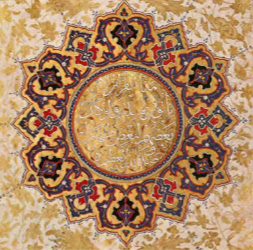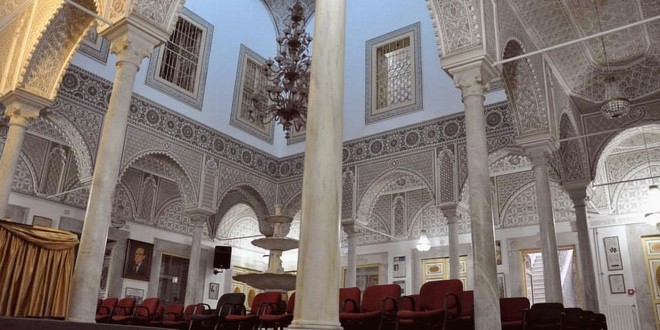Call for Papers International Meeting 2017 “Qur’anic Studies: Methods, Contexts and Interpretations”
Académie Tunisienne des Sciences, des Lettres et des Arts Département des Sciences islamiques and International Quranic Studies Association (IQSA) are co-hosting the International Qur’an Conference on “Qur’anic Studies: Methods, Contexts, and Interpretations” at the Beit al-Hikma in Carthage, Tunisia on July 4-6, 2017.
Qurʾanic studies (`Ulum al-Qur’an), which developed between the 2nd/8th and 9th/15th centuries represents one of the cornerstones of the Islamic sciences. `Ulum al-Qurʾan can be defined as the science that analyses the themes, forms and purposes of the Qurʾanic text. This conference aims to examine the principles, methods and the nature of the knowledge stemming from Qurʾanic sciences. Thus, it is the epistemological status of Qurʾanic studies that will be discussed. To this end, we will be interested, for example, by the various interpretations of the famous verse 16:89: wa-nazzalnā ʿalayka l-kitāba tibyānan li-kulli šayˈin (« We have sent down the Book to you as a clarification of all things ») or the questions of the emergence, the categories and concepts or the evolutions of Qurʾanic sciences (medieval, modern and contemporary).
Alongside this epistemological reflection, the symposium will focus on methodologies of qurʾanic analysis from traditional Qurʾanic sciences or from the latest developments in qurʾanic studies. We will analyse their assumptions, their applications and their consequences for our current understanding of the text. Particular attention will be paid to the recent developments in Qurʾanic studies in Europe and North America. The context of the emergence of the Qurʾan and the formation of the canonical text will be discussed in light of new sources: Early Qurʾanic manuscripts, unpublished or little known arabic sources, or Arabian graffiti of the 7th century. The intertextual relationship between the Qurʾan and earlier scriptural traditions in the broader context of late antiquity will also be highlighted. Here we would like to emphasize the work of rewriting and re-appropriation of biblical and parabiblical texts by the Qurʾan and Islamic exegesis. Finally, using new tools of contemporary linguistics and methods from Biblical studies, we will will raise the question of the specificities of the text in terms of argumentation, polemics and composition.
A third complementary approach to epistemological and methodological reflections will focus on Qurʾanic themes and interpretive issues they raise. An overarching theme of quranic « polemics » in the Qurʾan will be chosen. Through classical and modern exegetical literature, we will consider the rhetorical forms borrowed, the historical development of interpretation, as well as conflicts in interpretation and their implications. We will pay particular attention to the critical contributions that attempt to contextualize polemic in terms of the narrow context of tribal Arabia or more generally Late Antiquity.
The meeting will therefore focus on the following three areas:
- Epistemology: The Place of the Qurʾanic Studies in Islamic sciences
- Methods and Tools (Presuppositions, Applications and Purposes)
- Classical
- Contemporary
- Themes and Interpretations: Qurʾanic polemics
- Classical
- Contemporary
The colloquium will be held on July 4-6, 2017. Venue: The Academy “Beït al-Hikma” at Carthage.
We have the honor and the pleasure to solicit our colleagues to collaborate and present papers related to these plan. They are kindly invited to submit an abstract (about 500 words) including name of the proponent, title, and description of the proposal, before December 31, 2016, to the following e-mail address: mehdi.azaiez@kuleuven.be. They will be informed of the acceptation of their proposals before March 31, 2017.
Colloque International
Les études coraniques : méthodes, contextes et interprétations
Beit al-Hikma, Carthage, 4-6 juillet 2017
Argument :
Les études coraniques (ʿulūm al-Qur’ān) développées entre le 2ème/8ème et le 9ème/15ème siècles représentent un des pivots des sciences islamiques. Elles peuvent se définir comme les sciences qui interrogent les thèmes, les formes et les finalités du texte coranique. Ce colloque vise à interroger les principes et fondements, les méthodes mais aussi la nature de la connaissance issue des sciences coraniques. C’est donc le statut épistémologique des études coraniques qui sera examiné. A cet effet, on pourra s’intéresser, par exemple, aux interprétations du célèbre verset 16:89 : wa-nazzalnā ʿalayka l-kitāba tibyānan li-kulli šay’in (« Et Nous avons fait descendre sur toi le Livre, comme un exposé explicite de toute chose ») ou encore traiter des questions de l’émergence, des catégories et concepts ou encore des évolutions des sciences coraniques (médiévale, moderne et contemporaine).
Parallèlement à cette réflexion épistémologique, ce colloque se portera sur les méthodologies d’analyse du Coran issues des sciences coraniques traditionnelles ou des derniers développements de la recherche coranologique. On s’intéressera à leurs présupposés, leurs applications et leurs conséquences pour notre compréhension actuelle du texte. On s’informera particulièrement des récents développements des études coraniques en Europe et en Amérique du Nord. C’est d’abord le contexte d’émergence du Coran qu’il s’agira d’étudier ainsi que la formation du texte canonique à l’appui de sources (et de méthodes) inédites : manuscrits coraniques du 7ème siècle, sources inédites ou peu connues, ou graffitis de l’Arabie du 7ème siècle. C’est ensuite les relations intertextuelles entre le Coran et les traditions scripturaires antérieures dans le contexte large de l’Antiquité tardive qu’il s’agira d’examiner. On questionnera ici le travail de réécriture et de réappropriation de textes bibliques, et parabibliques par le Coran et l’exégèse islamique. Enfin, à partir de nouveaux outils de la linguistiquecontemporaine et de méthodes issues des études bibliques on interrogera les spécificités de ce texte en matière d’argumentation, de polémique et de composition.
Une troisième approche complémentaire aux réflexions épistémologiques et méthodologiques s’intéressera aux thématiques coraniques et aux enjeux interprétatifs qu’elles soulèvent. On choisira ici un thème transversal autour de la « polémique » dans le Coran. A travers la littérature exégétique classique et moderne, on s’interrogera sur les formes rhétoriques empruntées, sur les significations et les conséquences liées aux interprétations successives et parfois contradictoires autour de ces deux thèmes. On portera une attention particulière aux contributions critiques qui tentent de contextualiser cette violence à l’aune du contexte restreint de l’Arabie tribale ou plus largement de l’Antiquité Tardive.
Cette rencontre s’articulera donc autour des trois axes suivants :
- Epistémologie : le statut des études coraniques dans les sciences islamiques
- Méthodes : les outils d’analyse (présupposés, applications et finalités)
- Classiques
- Contemporains
- Thèmes et Interprétations : autour de la polémique coranique
- Classiques
- Contemporains
Le colloque se tiendra les 4 et 6 juillet 2017 à l’Académie « Beït al-Hikma » à Carthage.
Les propositions d’article, en arabe, anglais ou en français doivent être transmis, avant le 31 décembre 2016 à mehdi.azaiez@kuleuven.be.
D’une longueur d’une page, les propositions devront inclure :
– le titre de l’article,
– un argumentaire (maxi 500 mots),
– toutes les données nécessaires à l’identification de l’auteur : nom, affiliation institutionnelle, adresse professionnelle, téléphone et e-mail.
Les propositions sélectionnées seront connues avant le 31 mars 2017.
ملتقى دولي
الدراسات القرآنية: المناهج، السياقات والتأويلات
بيت الحكمة، قرطاج 4-6 جويلية 2017
تمثّل الدراسات القرآنية (علوم القرآن)، والتي طُوِّرت بين القرنين 2 و8 هجري (9 و15 م)، إحدى الركائز الأساسية للعلوم الإسلامية. ويمكن تعريفها بأنها العلوم التي تُسائل موضوعات وأشكالَ وأيضا أغراضَ النص القرآني. يهدف هذا المؤتمر إلى مناقشة مبادئ وأُسس ومناهج وكذلك طبيعة المعرفة النابعة من علوم القرآن. وبالتالي فإن الوضع المعرفي للدراسات الإسلامية هو الذي سيتم تحليله. وفي هذا الصّدد، نستطيع، على سبيل المثال، تسليط الضوء على مختلف التفسيرات للآية الشهيرة من سورة النحل: “وَنَزَّلْنَا عَلَيْكَ الْكِتَابَ تِبْيَانًا لِّكُلِّ شَيْءٍ” (89 :16)، أو أيضا تناول الأسئلة المتعلقة بظهور المقولات والمفاهيم بالإضافة إلى التطورات التي عرفتها العلوم القرآنية (في العصور الوسطى والحديثة والمعاصرة).
وإلى جانب هذه المقاربة المعرفيّة سيركِّز هذا المؤتمر على مناهج تحليل القرآن الكريم سواء كانت منبَثِقة عن العلوم القرآنيّة التقليدية أو عن أحدث التطورات التي تشهدها البحوث والدراسات القرآنية. ومن هنا سيقع التطرق إلى الافتراضات التي بُنيت عليها هذه المناهج، وإلى تطبيقاتها وتداعياتها على فهمنا الحالي للنّص. كما سيتم تسليط اهتمام خاص على التطورات الأخيرة للدراسات القرآنية في أوروبا وأمريكا الشمالية. قبل كلّ شيئ سيتعلّق الأمر بمناقشة السياق الذي ظهر فيه القرآن وأدّى إلى تَشكُّل النصّ القانوني (المقدّس) بالاعتماد على مصادر (ومناهج) مُبتَكرة: مخطوطات قرآنية من القرن 7 ميلادي، مصادر لم تكن معروفة أو معروفة بشكل محدود، أو نقوش من الجزيرة العربيّة تعود إلى القرن 7 ميلادي. ثمّ بعد هذا سيتمّ تسليط الضوء على علاقات التّناص بين القرآن والتقاليد الكتابيّة الدينيّة السابقة، وذلك في سياق أوسع يشمل أواخر العصور القديمة. وسوف نبحث هنا عمليّة إعادة كتابة النصوص البيبليّة (الكتاب المقدّس) وشبه البيبليّة والتّطابق معها التي اعتمدها القرآن الكريم والتفسير الإسلامي. وأخيرا، انطلاقا من الأدوات الجديدة لعلوم اللّسانيّات المعاصرة ومناهج مُنبَثقة عن الدراسات البيبليّة، سيقع طرح الأسئلة حول خصوصيات هذا النص فيما يتعلّق بالحِجاج، والجدل والتأليف.
هناك مقاربة ثالثة مُكمِّلة للمقاربات المعرفيّة والمنهجيّة ستهتمّ بدورها بالموضوعات القرآنية والرّهانات التفسيريّة التي تثيرها. وسيقع هنا اختيار موضوع محوري يدور حول الجدل في القرآن. كما سيقع، من خلال الأدب التفسيري الكلاسيكي والحديث، التِماس الأشكال البلاغيّة المتوخاة والدّلالات وكذلك النتائج المترتّبة على التفسيرات المتتالية والمتناقضة أحيانا حول هذين الموضوعين. كما أنّه سيقع إعطاء اهتمام خاصّ للمساهمات النقديّة التي تحاول تناول هذا العنف في ضوء السّياق القَبَلي الضيِّق داخل الجزيرة العربيّة أو في سياق العصور القديمة المتأخّرة بشكل أوسع.
سيتمحور هذا الملتقى حول المحاور الثلاثة التالية:
- 1- نظريّة المعرفة: مكانة الدراسات القرآنيّة في العلوم الإسلاميّة
- 2- المناهج: أدوات التحليل (الافتراضات، التطبيقات والأغراض)
- أ- أدوات التحليل التقليديةة
- ب- أدوات التحليل المعاصرة
- 3- المواضيع والتفاسير: حول الجدل في القرآن
- أ- التقليدية
- ب- المعاصرة


